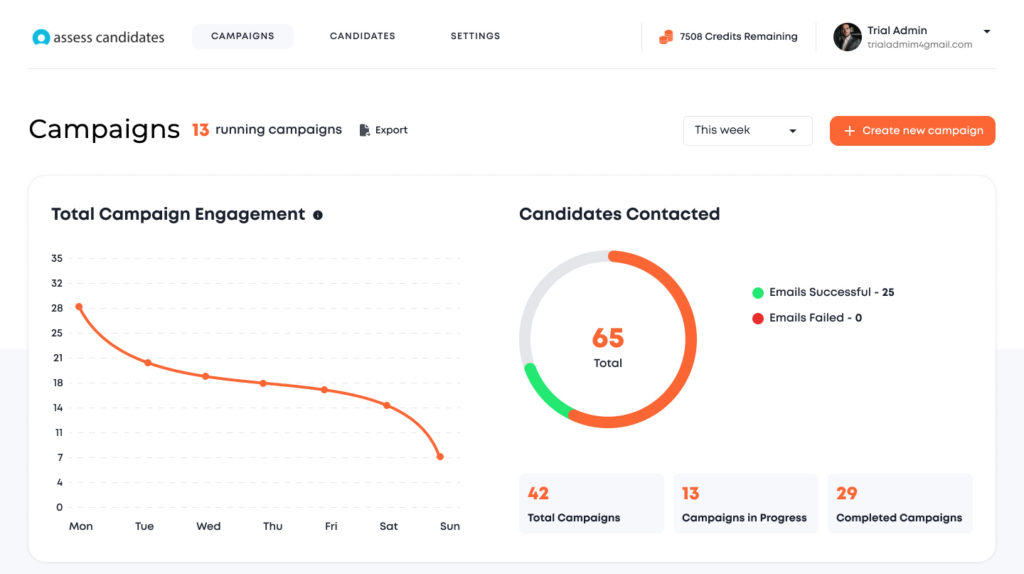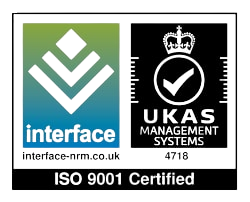How selecting the right hiring assessments can promote ethical leadership
As a professional in talent acquisition, you are faced with fierce competition for top talent and constantly changing technological trends. All recruiters must constantly seek innovative ways to attract and retain the best candidates – ensuring that their recruitment practices stay engaging and ethical. In this guide we delve into the profound impact that ethical leadership has on shaping your recruitment strategies, driving excellence in hiring practices, and fostering a workplace culture built on trust and transparency.
We explore how assessment tools, guided by ethical principles, can serve as your compass for candidate selection. Furthermore, we outline the numerous benefits ethical leadership offers for your recruitment outcomes, from enhanced employee retention to bolstered organizational reputation.
Join us on this journey through the intertwined realms of ethical leadership and recruitment, where leadership values, employee satisfaction, and diversity inclusion converge to drive success in the modern HR landscape.
Contents:
- What is ethical leadership?
- What is the role of ethical leadership in shaping a recruitment strategy?
- What are the examples of companies using ethical leadership practices in the hiring process?
- What impact do assessment tools have in ethical leadership?
- What are the benefits of ethical leadership on recruitment outcomes?
- Why is Assess Candidates your provider for ethical hiring?
- FAQs and Glossary of terms
1. What is ethical leadership?
Ethical leadership is a fundamental concept in today’s business landscape. It covers a set of principles and values that guide leaders in making moral and responsible decisions, both in their leadership roles and personal lives. At its core, ethical leadership aims to foster trust, transparency, and accountability within organizations. It’s not just about adhering to ethical standards but also demonstrating those values through actions and behaviors.
What is ethical leadership?
Ethical leadership is grounded in a set of core principles and values that guide leaders in making morally responsible decisions. These core principles are based on trust, transparency, and accountability within organizations, fostering an environment where employees and stakeholders can rely on ethical decision-making.
What are some examples of ethical leadership?
Illustrating ethical leadership through tangible examples from the corporate world can offer a clearer understanding of this crucial concept.
Let’s delve into four real-life scenarios where ethical leaders have made a significant impact on their organizations.
- Johnson & Johnson’s Ethical Crisis Management: When their Tylenol product was tampered with in the 1980s, CEO James Burke chose to recall and redesign the product, even though it incurred substantial losses. This swift, ethical response not only saved lives but also solidified the company’s reputation for putting consumer safety first.
- Costco’s Employee-Centric Approach: Costco, a leading retail company, is recognized for its ethical approach to employee well-being. CEO Craig Jelinek ensures that the company pays its workers fair wages, offers excellent benefits, and promotes a supportive work environment. This commitment to employees not only aligns with ethical principles but also fosters a loyal and motivated workforce.
- IBM’s Diversity and Inclusion Initiatives: IBM, a technology and consulting firm, demonstrates ethical leadership through its diversity and inclusion efforts. CEO Arvind Krishna has championed these initiatives, aiming to create a more diverse and equitable workplace. By fostering a culture of inclusion, IBM not only adheres to ethical principles but also attracts a broad range of talent, enhancing innovation and employee satisfaction.
- Ben & Jerry’s Social Responsibility: The ice cream company Ben & Jerry’s has made a name for itself by intertwining social responsibility with business. The company’s founders, Ben Cohen and Jerry Greenfield, prioritize ethical sourcing and support various social causes. This commitment to social and environmental issues has enhanced the company’s reputation and drawn like-minded employees who are passionate about positive change.
Partner with leaders in ethical hiring. Hire For Free
2. What is the role of ethical leadership in shaping a recruitment strategy?
Ethical leadership doesn’t stop at the boardroom; it guides every facet of an organization, including its approach to talent acquisition. A recruitment strategy rooted in ethical principles not only attracts top talent but also sets the stage for a workplace culture that values integrity, diversity, and responsible decision-making. This, in turn, contributes to an organization’s long-term success and positive employer reputation.

Here’s how ethical leadership influences recruitment strategies.
11 examples of ethical leadership’s impact on recruitment strategy:
- Cultural Fit and Values Alignment: Ethical leaders ensure that recruitment efforts prioritize cultural fit and values alignment. They actively seek candidates who resonate with the organization’s ethical values, fostering a culture of shared principles and purpose.
95% of employees believe that ethical leadership has a significant positive impact on their behavior at work.
Centre for Creative Leadership
- Inclusive Talent Acquisition: Ethical leaders champion diversity and inclusion, making it an integral part of the recruitment process. This approach broadens the talent pool, leading to a more varied and innovative workforce, which can enhance an organization’s competitive advantage.
Did you know that gender-diverse companies are 21% more likely to experience above-average profitability, and ethnically diverse companies have 33% more likelihood of above-average profitability?
McKinsey & Company
- Candidate Assessment: Ethical leaders encourage a hiring process that assesses candidates not only for their technical skills but also for their ethical qualities and commitment to responsible decision-making. This helps in building a team that is not only proficient but also guided by strong moral principles.
- Trust in Organizations: A recruitment strategy that aligns with ethical leadership principles creates trust in the organization. Potential hires are more likely to be attracted to an organization with a reputation for ethical leadership and responsible practices.
Did you know that strong brands built on ethics attract 50% more qualified applicants?
- Corporate Responsibility: Ethical leaders emphasize corporate responsibility, which extends to the hiring process. This can manifest in fair compensation, equal opportunity employment, and sustainable practices, further enhancing an organization’s reputation and appeal to prospective employees.
86% of respondents agree that the need for real moral leadership in business is more urgent than ever today.
The HOW Institute for Society.
- Transparency and Fairness: Ethical leaders foster transparency in the hiring process, ensuring that all candidates have equal opportunities and receive honest and constructive feedback. This enhances trust and confidence in the organization.
- Social Responsibility: Companies committed to ethical leadership often look for candidates who are socially responsible and who contribute positively to the community. This may involve volunteer work, sustainability efforts, or support for local causes.
- Sustainability and Environmental Stewardship: Organizations with strong ethical hiring practices may seek candidates who demonstrate a commitment to environmental stewardship and sustainability, aligning with the company’s environmental goals.
- Inclusive Interviewing: Ethical leaders create an inclusive interview process by providing reasonable accommodations for candidates with disabilities, respecting cultural differences, and ensuring all interviewers receive diversity and inclusion training.
- Holistic Assessment: Ethical leadership emphasizes a holistic candidate assessment, focusing not only on technical skills but also on soft skills, ethical qualities, and cultural fit. This leads to a well-rounded, values-aligned workforce.
- Promotion of Ethical Values: Ethical leaders actively promote ethical values during the hiring process, demonstrating a commitment to responsible decision-making and creating a workplace culture rooted in these principles.
Did you know that nearly 37 percent of Gen Zs, and 36 percent of millennials, have rejected a job and assignment based on personal ethics?
Deloitte
3. What are the examples of companies using ethical leadership practices in the hiring process?
Having seen the profound impact ethical leadership has for talent acquisition, we will guide you through a few practical examples. In a world where ethical leadership is becoming increasingly important, several prominent companies are leading the way by integrating ethical values into their hiring processes. These organizations not only seek top talent but also place a strong emphasis on aligning their workforce with their core ethical principles. Here are a few notable examples.
Examples of companies that prioritize ethical leadership in hiring:
- Unilever: Unilever, a consumer goods giant, integrates ethical values into its hiring process. They assess potential employees not only for their technical skills but also for their alignment with Unilever’s sustainability goals. The company’s commitment to reducing its environmental footprint and promoting social responsibility is evident throughout its recruitment strategy.
- Patagonia: This outdoor clothing company has a strong ethical hiring process. Patagonia seeks employees who are not just passionate about their products but also aligned with the company’s environmental and social responsibility mission. They are known for encouraging employees to participate in environmental initiatives during work hours.
- Microsoft: Microsoft actively promotes ethical hiring practices by focusing on diversity and inclusion. They have set ambitious goals to increase diversity within the organization and have created an inclusive interview process, ensuring that candidates from all backgrounds have equal opportunities.
- Ben & Jerry’s: The ice cream company has long been associated with ethical leadership. They prioritize hiring employees who share their social and environmental values. In fact, their commitment to ethical hiring is a core part of their mission, and it’s reflected in their corporate culture and practices.
- Google: Google, a technology giant, places a strong emphasis on ethical leadership in its hiring practices. The company not only values technical expertise but also assesses candidates for their alignment with Google’s ethical principles, including a commitment to user privacy, data security, and responsible AI development. Google actively promotes diversity and inclusion, aiming to create a workforce that represents a wide range of backgrounds and perspectives. They’ve implemented comprehensive training on bias and inclusivity for their interviewers, ensuring a fair and equitable hiring process.
- The Body Shop: The Body Shop, a cosmetics and skincare company, has a history of ethical leadership in the beauty industry. They prioritize ethical hiring by seeking candidates who share their values regarding cruelty-free products, fair trade, and sustainability. The company actively promotes a commitment to social and environmental responsibility, and this extends to its hiring process. The Body Shop aims to build a team that not only excels in product knowledge but also embraces their core ethical principles, creating a unique and values-driven work culture.

70% of professionals wouldn’t put up with poor workplace culture, and 25% of staff said it was the main reason they’d change jobs.
4. What impact do assessment tools have in ethical leadership?
Assessment tools play a crucial role in ethical leadership by helping organizations identify candidates who not only possess the right skills and qualifications but also align with the company’s ethical values and principles. These tools, including psychometric tests, ability tests, game-based assessments, and video interviews, have a profound impact on ethical leadership in several ways.
6 ways assessment tools support ethical leadership in recruitment
- Alignment with Ethical Values: Ethical leadership demands that organizations prioritize candidates who share the company’s ethical values and principles. Situational Judgement Tests and Video Interviews, for example, can assess a candidate’s alignment with these values. Behavioural assessments in psychometric tests can reveal a candidate’s decision-making tendencies and ethical inclinations.
- Objective Evaluation: Assessment tools provide an objective and standardized means of evaluating candidates. This is particularly important in ethical leadership, as it helps avoid biases that might arise from subjective judgments during the hiring process. Objective evaluations ensure that candidates are assessed fairly and consistently, promoting diversity and inclusion.
- Skill Assessment: Ability tests, such as cognitive or technical skills assessments, help determine whether a candidate has the requisite skills for the job. An ethical leader ensures that candidates are not only ethically aligned but also competent in their roles, promoting a balance between ethics and expertise.
- Efficiency and Consistency: Game-based assessments can be used to simulate real-world ethical dilemmas. They provide an efficient and consistent means of evaluating a candidate’s ethical decision-making in various scenarios. These tools help in identifying individuals who are likely to demonstrate ethical behavior when faced with challenging situations in the workplace.
- Reducing Ethical Risks: Ethical leadership involves making decisions that are not only legally sound but also ethically defensible. The use of assessment tools contributes to identifying candidates who are less likely to engage in unethical conduct, thus reducing ethical risks for the organization.
- Enhanced Employee Retention: By ensuring that candidates align with ethical values and principles from the outset, assessment tools contribute to higher employee retention rates. Employees who share these values are more likely to stay engaged and satisfied in their roles, fostering a positive workplace culture.
In summary, assessment tools are powerful instruments in ethical leadership, helping organizations identify candidates who align with their ethical values, promoting objective and fair evaluations, and reducing ethical risks. These tools ensure that the ethical dimensions of leadership are embedded in the hiring process, ultimately contributing to an organization’s long-term success and positive corporate reputation.
Try ethical pre-employment assessments today. View Plans
5. What are the benefits of ethical leadership on recruitment outcomes?
Ethical leadership profoundly influences recruitment outcomes in a multitude of positive ways. By prioritizing ethical values and principles in the hiring process, organizations can reap a range of benefits that extend beyond recruitment and hiring, impacting the overall success and reputation of the company.
Top 7 benefits of ethical leadership on recruitment outcomes
Here are the key benefits of ethical leadership on recruitment outcomes.
- Enhanced Employer Reputation: Ethical leadership fosters a reputation for integrity and responsible decision-making. This reputation serves as a powerful magnet, attracting top-tier talent who are not only looking for a job but also an employer with strong ethical values.
Did you know that 92% of employees believe it is important for their CEO to speak out on societal issues. Ethical leadership’s role in shaping a CEO’s stance on such issues can significantly impact a company’s reputation.
Edelman Trust Barometer
- Attracting and Retaining Top Talent: Ethical leadership creates a culture that values employee well-being, fairness, and inclusivity. Such a workplace culture is inherently appealing to high-caliber candidates, and it increases the likelihood of retaining talent in the long run.
77% of job seekers stated that they consider ethical leadership and company’s culture and values before applying for a job.
Glassdoor
- Improved Candidate Quality: Ethical recruitment practices lead to higher-quality candidates who are not only skilled but also aligned with the organization’s values. Candidates who share ethical values are more likely to excel in their roles and contribute positively to the company.
- Positive Workplace Culture: Ethical leadership shapes a positive and ethical workplace culture from the outset. This culture encourages collaboration, respect, and ethical behavior, fostering a sense of belonging and shared values among employees.
Company culture is an essential factor for 46% of job seekers.
Teamstage
- Reduced Turnover: By aligning candidates with the company’s ethical values and principles, ethical leadership helps reduce turnover rates. Employees who feel a strong ethical connection to their workplace are more likely to stay engaged and committed to the organization.
Companies with ethical leadership practices have a 16% lower turnover rate compared to those with less ethical leadership.
Harvard Business Review
- Enhanced Corporate Responsibility: Ethical leaders actively promote corporate responsibility, which extends to the hiring process. This includes fair compensation, equal opportunity employment, and sustainable practices, reinforcing an organization’s commitment to responsible business conduct.
- Sustained Success: Ethical leadership is a driving force behind sustained organizational success. An ethical workplace culture results in a more motivated and engaged workforce, ultimately leading to increased productivity, innovation, and positive financial outcomes.
70% of respondents with managers in the top tier of moral leadership say their organizations are oriented to long-term rather than short-term performance metrics.
World Economic Forum
In conclusion, ethical leadership doesn’t only guide recruitment but influences the entire lifecycle of an employee’s journey within an organization. The benefits of ethical leadership on recruitment outcomes are far-reaching, creating a workplace environment that attracts top talent, promotes a positive culture, and ensures long-term success.
6. Why is Assess Candidates your best partner for ethical hiring?
At Assess Candidates, we understand that ethical hiring is not just a desirable aspiration but a crucial cornerstone of building a strong, responsible, and successful organization. As your partner for ethical hiring, we offer a range of practical solutions to ensure you attract, assess, and select candidates who align with your ethical values and principles.
How Assess Candidates helps you build an ethical assessment process
With Assess Candidates as your partner you get:
- Customized Ethical Assessments: We provide tailored ethical assessment tools that help you identify candidates who share your organization’s ethical values. Our assessments go beyond standard qualifications to evaluate a candidate’s ethical inclinations and decision-making abilities, ensuring that you build a team of individuals committed to responsible conduct.
- Objective and Fair Candidate Evaluation: We are committed to promoting diversity and inclusion in the hiring process. Our assessment methods are designed to be objective and fair, reducing bias and ensuring that all candidates, regardless of their background, receive equal opportunities. Ethical leadership starts with a fair evaluation, and Assess Candidates is here to make it a reality.
- Enhanced Organizational Reputation: We recognize that ethical hiring goes beyond immediate recruitment outcomes. It’s about building a corporate culture of integrity and responsibility. By selecting candidates who are aligned with your ethical values, we contribute to the long-term success of your organization and enhance your reputation as an ethical leader in your industry.
Choose Assess Candidates as your partner for ethical hiring, and together, we’ll build a workforce that not only excels in skills but also embodies your ethical principles. With our customized assessments, fair evaluation practices, and a commitment to enhancing your organization’s reputation, we’re dedicated to helping you foster a culture of ethics, diversity, and success. Join hands with Assess Candidates and lead the way in ethical leadership.

Example of a company struggling to implement ethical leadership in recruitment.
Problem:
Over the years, your recruitment team has been under pressure to meet ambitious targets, leading to a situation where the interviewing stage felt rushed and ineffective. The team had to rely on initial screening which is thought to be out-dated and historically known to be rather ineffective in gauging soft skills and candidate’s internal motivations. This has resulted in the recruitment of candidates who do not align with the company’s core values and principles, ultimately affecting the workplace culture and tarnishing the organization’s reputation.
Assess Candidates Solution:
Our experienced recruitment professionals will work directly with your team to combine a results-driven approach to meet the ambitious recruitment targets with cutting edge technology and customized assessment solutions to ensure that whilst targets are met, the quality and ethical standards are still upheld. By automating parts of the recruitment process your team will gain back valuable time to carefully evaluate pre-selected candidates for their fitness to your company’s culture and mission.
7. FAQs and Glossary of terms
FAQs
- What is ethical leadership, and why is it important in recruitment?
- Ethical leadership is a set of principles and values that guide leaders in making moral and responsible decisions. It is crucial in recruitment to ensure that candidates align with an organization’s ethical values and principles, fostering trust, transparency, and accountability.
- How does ethical leadership influence recruitment strategy?
- Ethical leadership shapes recruitment strategies by prioritizing cultural fit, values alignment, inclusivity, and a holistic assessment of candidates. It promotes a workplace culture built on integrity, diversity, and responsible decision-making.
- What are examples of companies practicing ethical leadership in hiring?
- Companies like Unilever, Patagonia, Microsoft, Ben & Jerry’s, Google, and The Body Shop prioritize ethical leadership in their hiring processes. They actively seek candidates who share their ethical values and principles, fostering a culture of shared values and integrity.
- What is the impact of assessment tools on ethical leadership in recruitment?
- Assessment tools such as psychometric tests, ability tests, game-based assessments, and video interviews help identify candidates who align with an organization’s ethical values. They provide objective evaluation, reduce bias, and contribute to ethical decision-making.
- What are the benefits of ethical leadership on recruitment outcomes?
- Ethical leadership enhances an organization’s reputation, attracts and retains top talent, improves candidate quality, fosters a positive workplace culture, reduces turnover, and promotes corporate responsibility and sustained success.
- Why is Assess Candidates the best partner for ethical hiring?
- Assess Candidates offers customized ethical assessments, objective evaluation, and a commitment to enhancing organizational reputation. We ensure that your recruitment practices align with ethical principles, attracting candidates who share your values and contributing to long-term success.
Glossary of Terms
- Ethical Leadership: A leadership approach that emphasizes moral and responsible decision-making guided by a set of core principles and values, promoting trust, transparency, and accountability within organizations.
- Cultural Fit: The alignment of a candidate’s values, behaviors, and beliefs with those of an organization, contributing to a harmonious workplace culture.
- Inclusive Talent Acquisition: A recruitment strategy that prioritizes diversity and inclusion, broadening the talent pool to create a more varied and innovative workforce.
- Corporate Responsibility: A commitment to ethical, social, and environmental responsibility in business operations, encompassing fair compensation, equal opportunity employment, and sustainable practices.
- Holistic Assessment: An evaluation of candidates that considers not only their technical skills but also their ethical qualities, soft skills, and cultural fit.
- Objective Evaluation: An unbiased and standardized means of assessing candidates, reducing subjective judgments and promoting diversity and inclusion in the hiring process.
